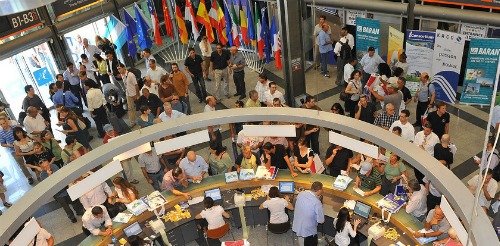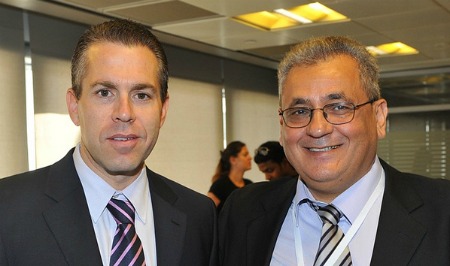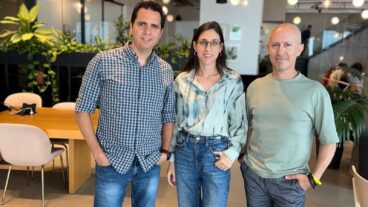The CleanTech 2011 mega-event in Tel Aviv displays Israel’s advanced water, solar, wind and natural gas energy solutions.

Judging by the number of companies that have already signed on for next year’s expo, Haim Alush, CEO of CleanTech 2011, says this year’s event must have been a good place for people to do business with Israeli clean-tech companies.
The event, held annually in Tel Aviv for the past 15 years, brought out about 20,000 people from 85 countries. Early reports suggest some NIS 250 million (about $75 million) worth of business transactions were made during the course of CleanTech 2011.
The foreigners at the event comprised powerhouse delegations organized by countries including Canada, the United States, Africa, Poland and even nearby Jordan, which has strained political relations with Israel.
“We see that the clean-tech event was interesting people from all over the world,” Alush tells ISRAEL21c. “There was very big business happening. The biggest success was that exhibiters want to exhibit again next year. We also have some companies that did not exhibit this year that want to exhibit next year. We’ll have to open another hall to hold them; the biggest hall is already fully booked.”
Solar still heating up the room
On the agenda was the opportunity to explore green building applications for the homeowner, like the solar walls produced by SolarOr, as well as other Israeli solar energy technologies such as Solar By Yourself, Ralco and SolarEdge.
Also on display were wind energy solutions, gray-water recycling tools, water technologies and environmentally compatible techniques for natural gas extraction, process and delivery.
The latter was especially timely, as a third sabotage of the Israeli-Egyptian gas pipeline right before the event was a clear and loud warning to Israelis that they cannot count on any of their neighbors for energy security. Despite Israel having its own mega-gas wells buried under its coast, it will take some time to access the energy.
Sparking debates, providing solutions
At the event, Israel’s Environment Minister Gilad Erdan urged innovators to develop homegrown technologies that will keep Israel’s renewable energy flowing.
“Everybody involved in the clean-tech field was there and it was nice to see that delegations from all over the world are coming from Canada, Africa, from Jordan, from Paraguay, to see Israeli technologies, and that some of them have already started negotiating,” says conference PR person Anat Cherpak.

“They want to take our technologies and to bring them to Poland, Canada, the US and Jordan,” she says.
The guests also had the opportunity to visit the International Water Symposium held in parallel, where Israelis gave the floor to Palestinians vying for water equality with the Jewish state.
The conversations were emotional and sometimes heated, but all involved agreed it was a starting point for implementing solutions between Israel and its neighboring Palestinian Authority and Jordan.
A few other Israeli-made solutions of note included two-kilowatt wind turbines for homeowners by Israel Wind Power; a thermal camera from the security company Opgal that makes it possible to detect gas leaks from afar; and Leadsun, a solar street- and outdoor-lighting system based on lithium batteries.
Water was perhaps the hottest topic of interest, says Cherpak, pointing to the Israeli native company Green Solutions and its Evergreen product for processing and redistributing household gray water back to the garden and toilet.
Other home gray-water solutions on the market are bulky and expensive, says CEO Gil Ben-Meir, who developed the concept in 2009 after returning to Israel from a 13-year stint in the United States. So far, about 150 of his processing units are set up in Israel, and he hopes to enter the US market soon.
The response to his CleanTech booth was evident: Ben-Meir was busy driving all over Tel Aviv with his assistant, Elad, giving new price quotes to potential customers.












